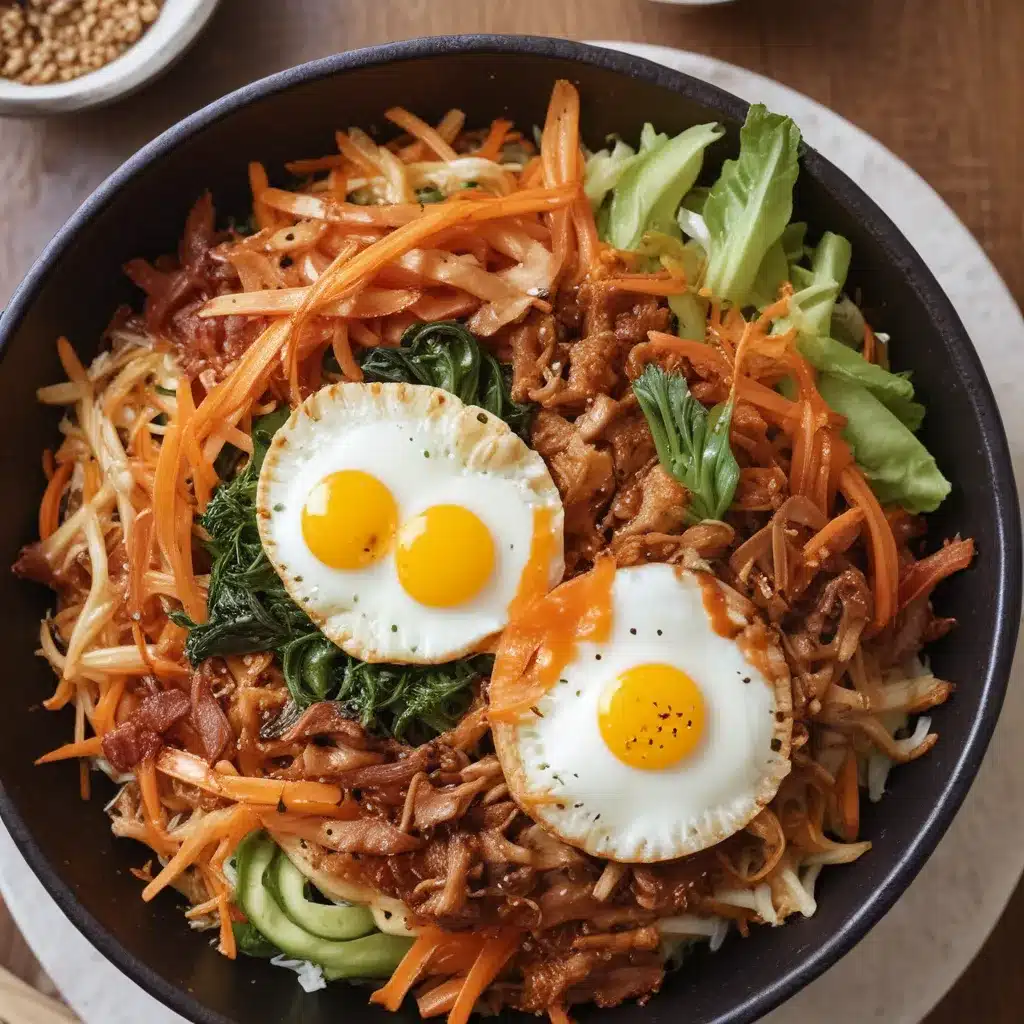
Unleashing the Crispy Delight of Kimchi Chips in Your Bibimbap
I must admit, when I first heard the idea of adding kimchi chips to bibimbap, I was a bit skeptical. Bibimbap is one of those Korean dishes that I consider to be perfect the way it is – a harmonious blend of rice, vegetables, meat, and that signature gochujang (Korean chili paste) sauce. Why tamper with a classic, right? But then I tried it, and oh my goodness, my taste buds were completely transformed.
The crunch of the kimchi chips adds a whole new dimension to the familiar flavors of bibimbap. It’s like taking an already amazing dish and elevating it to a whole new level of deliciousness. The salty, tangy, and slightly spicy notes of the kimchi chips perfectly complement the hearty, savory components of the bibimbap. It’s a flavor explosion in your mouth that will leave you wondering why you haven’t been doing this all along.
The Art of Crafting Crispy Kimchi Chips
Now, I know what you’re thinking – “But how do I make these magical kimchi chips?” Well, my friends, let me share the secrets with you.
The key to perfect kimchi chips is all about the preparation. You’ll want to start with high-quality, flavorful kimchi – the kind that packs a punch. I personally love using napa cabbage kimchi, but you can certainly experiment with other varieties as well. Once you’ve got your kimchi, the next step is to slice it into thin, crispy chips.
Slicing the Kimchi
- Use a sharp knife or a mandoline slicer to cut the kimchi into thin, even slices, about 1/8-inch thick.
- Be gentle and take your time – you don’t want the kimchi to tear or become too ragged.
- Aim for uniform slices so that they cook evenly.
Drying the Kimchi Chips
- After slicing, spread the kimchi chips out on a baking sheet lined with parchment paper.
- Let them air dry for at least 30 minutes, or up to an hour, to remove any excess moisture.
- This step is crucial for achieving that perfect crispiness.
Frying the Kimchi Chips
- Once the kimchi chips are dry, heat up a generous amount of neutral oil (such as vegetable or canola oil) in a large skillet or Dutch oven.
- Fry the kimchi chips in batches, taking care not to overcrowd the pan.
- Fry for 2-3 minutes per batch, or until the chips are golden brown and crispy.
- Drain the fried kimchi chips on a paper towel-lined plate.
Seasoning the Kimchi Chips
- While the chips are still hot, season them with a sprinkle of salt and any additional spices or seasonings you’d like.
- I like to add a bit of gochugaru (Korean chili flakes) for an extra flavor boost.
And there you have it – homemade, crispy kimchi chips that are ready to take your bibimbap to new heights!
Elevating Bibimbap with Kimchi Chips
Now that you know the secret to making these delectable kimchi chips, let’s talk about how to incorporate them into your bibimbap.
The Perfect Bibimbap Base
The foundation of a great bibimbap is, of course, the rice. I prefer to use short-grain, sticky rice that has been cooked to perfection. The rice should be warm, fluffy, and ready to act as a canvas for all the wonderful toppings.
Assembling the Bibimbap
- Start with a generous portion of the warm rice in a bowl.
- Arrange your choice of bibimbap toppings around the rice in a visually appealing way. Think sautéed or marinated vegetables, thinly sliced beef, a perfectly cooked egg, and of course, your homemade kimchi chips.
- Drizzle the whole thing with a healthy dose of gochujang sauce, and you’re ready to dig in!
The Magic of Kimchi Chips
The real star of the show, though, is the kimchi chips. Sprinkle them generously over the top of your bibimbap, allowing them to perch precariously on the sides of the bowl. As you take each bite, the crunch of the kimchi chips will add a delightful textural contrast to the soft, tender components of the dish.
But it’s not just about the crunch – the flavor of the kimchi chips takes the entire bibimbap experience to new heights. The salty, tangy, and slightly spicy notes of the kimchi perfectly complement the hearty, savory flavors of the other ingredients. It’s a match made in culinary heaven, I tell you!
Endless Possibilities with Kimchi Chips
The beauty of using kimchi chips in bibimbap is that it’s not just a one-trick pony. These crunchy, flavorful morsels can be used in all sorts of creative ways to elevate your Korean cuisine game.
Kimchi Chips as a Topping
- Sprinkle them over grilled or pan-seared meats, like bulgogi or galbi.
- Use them to add texture and flavor to your kimchi fried rice.
- Top your Korean-style tacos or burritos with a generous helping of kimchi chips.
Kimchi Chips as a Snack
- Enjoy them on their own as a crunchy, addictive snack.
- Incorporate them into your favorite Korean-inspired dips and spreads.
- Toss them with some roasted nuts and seeds for a delightful trail mix.
Kimchi Chips as a Garnish
- Add a sprinkle of kimchi chips to your Korean-style soups and stews for an extra pop of flavor.
- Use them to top your Korean barbecue dishes, like ssam wraps or lettuce cups.
- Elevate your Korean-inspired salads by adding a generous helping of kimchi chips.
The possibilities are truly endless when it comes to using kimchi chips to enhance your Korean cuisine experience. So go forth, my friends, and let your culinary creativity shine!
Bringing Korean Flavors to Boston
Of course, as a lover of all things Korean cuisine, I can’t help but gush about the incredible Korean restaurants we have here in Boston. If you’re looking to enjoy an authentic bibimbap experience, complete with those irresistible kimchi chips, I highly recommend checking out Korean Garden Boston.
The team at Korean Garden Boston is truly passionate about sharing the flavors of their homeland with the local community. Their bibimbap is absolutely out of this world, and they even offer the option to add those crispy kimchi chips as a topping. Trust me, it’s a game-changer.
But Korean Garden Boston isn’t just about bibimbap – they have an extensive menu that showcases the full breadth of Korean cuisine. From classic dishes like bulgogi and japchae to innovative fusion creations, there’s something to delight every palate. And the best part? They use only the freshest, highest-quality ingredients, ensuring that every bite is a true culinary adventure.
So if you’re feeling inspired to bring the flavors of Korea to your own kitchen, be sure to head over to Korean Garden Boston and let them share their passion with you. Who knows, you might just discover your new favorite way to enjoy bibimbap!
